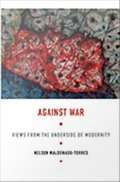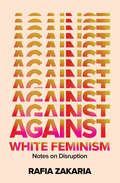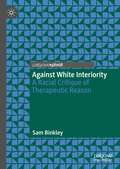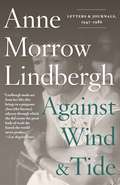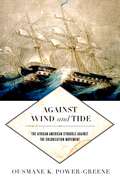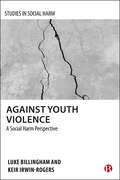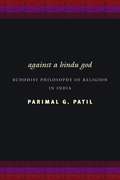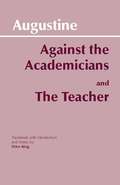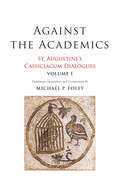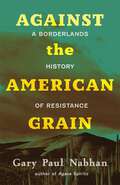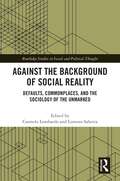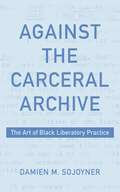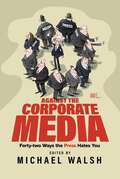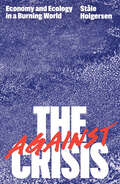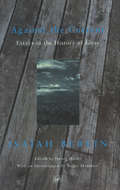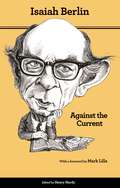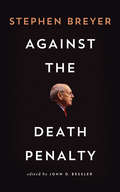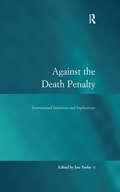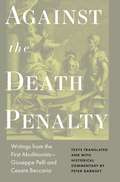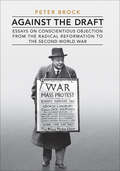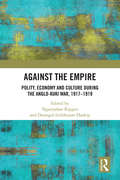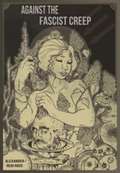- Table View
- List View
Against War: Views from the Underside of Modernity
by Nelson Maldonado-TorresNelson Maldonado-Torres argues that European modernity has become inextricable from the experience of the warrior and conqueror. In Against War, he develops a powerful critique of modernity, and he offers a critical response combining ethics, political theory, and ideas rooted in Christian and Jewish thought. Maldonado-Torres focuses on the perspectives of those who inhabit the underside of western modernity, particularly Jewish, black, and Latin American theorists. He analyzes the works of the Jewish Lithuanian-French philosopher and religious thinker Emmanuel Levinas, the Martiniquean psychiatrist and political thinker Frantz Fanon, and the Catholic Argentinean-Mexican philosopher, historian, and theologian Enrique Dussel. Considering Levinas's critique of French liberalism and Nazi racial politics, and the links between them, Maldonado-Torres identifies a "master morality" of dominion and control at the heart of western modernity. This master morality constitutes the center of a warring paradigm that inspires and legitimizes racial policies, imperial projects, and wars of invasion. Maldonado-Torres refines the description of modernity's war paradigm and the Levinasian critique through Fanon's phenomenology of the colonized and racial self and the politics of decolonization, which he reinterprets in light of the Levinasian conception of ethics. Drawing on Dussel's genealogy of the modern imperial and warring self, Maldonado-Torres theorizes race as the naturalization of war's death ethic. He offers decolonial ethics and politics as an antidote to modernity's master morality and the paradigm of war. Against War advances the de-colonial turn, showing how theory and ethics cannot be conceived without politics, and how they all need to be oriented by the imperative of decolonization in the modern/colonial and postmodern world.
Against White Feminism: Notes On Disruption
by Rafia ZakariaA radically inclusive, intersectional, and transnational approach to the fight for women’s rights. <p><p> Upper-middle-class white women have long been heralded as “experts” on feminism. They have presided over multinational feminist organizations and written much of what we consider the feminist canon, espousing sexual liberation and satisfaction, LGBTQ inclusion, and racial solidarity, all while branding the language of the movement itself in whiteness and speaking over Black and Brown women in an effort to uphold privilege and perceived cultural superiority. An American Muslim woman, attorney, and political philosopher, Rafia Zakaria champions a reconstruction of feminism in Against White Feminism, centering women of color in this transformative overview and counter-manifesto to white feminism’s global, long-standing affinity with colonial, patriarchal, and white supremacist ideals. <p><p> Covering such ground as the legacy of the British feminist imperialist savior complex and “the colonial thesis that all reform comes from the West” to the condescension of the white feminist–led “aid industrial complex” and the conflation of sexual liberation as the “sum total of empowerment,” Zakaria follows in the tradition of intersectional feminist forebears Kimberlé Crenshaw, Adrienne Rich, and Audre Lorde. Zakaria ultimately refutes and reimagines the apolitical aspirations of white feminist empowerment in this staggering, radical critique, with Black and Brown feminist thought at the forefront.
Against White Interiority: A Racial Critique of Therapeutic Reason
by Sam BinkleyThis book presents a bold critique of the new racial sensibility that has attained global prominence following the police murder of George Floyd. Through a set of managerial and therapeutic discourses, this new sensibility describes the inner racial life of white subjects, inducing them to adopt a therapeutic attitude toward deeply interiorized white emotions and conflicts. In so doing, the new racial sensibility promises to remake whiteness in the image of the self-aware racial ally. However, such an appeal, it is argued, serves the subtle function of the preservation of white racial dispositions, and the reproduction of the very racism it sets out to transform. Adopting a critical lens derived from Michel Foucault’s analysis of sexuality, together with an engagement with sociological, psychoanalytic and phenomenological reflections on shame as a racial affect, a critique of white interiority considers alternative frames through which white anti-racist subjection might be imagined.
Against Wind and Tide: Letters and Journals, 1947-1986
by Reeve Lindbergh Anne Morrow LindberghWhy, as an eager and talented writer, has Anne Morrow Lindbergh published so relatively little in forty years of marriage?" asked reviewer John Barkham in 1970. "After a promising start with those first books on flying, she tapered off into long silences broken by an infrequent volume of verse or prose." Many years later, Lindbergh replied with a quote from Harriet Beecher Stowe, who claimed that writing, for a wife and mother, is "rowing against wind and tide." In this sixth and final collection of Lindbergh's diaries and letters, taking us from 1947 to 1986, we mark her progress as she navigated a remarkable life and a remarkable century with enthusiasm and delight, humor and wit, sorrow and bewilderment, but above all devoted to finding the essential truth in life's experiences through a hard-won spirituality and a passion for literature. Between the inevitable squalls of life with her beloved but elusive husband, the aviator Charles A. Lindbergh, she shepherded their five children through whooping cough, horned toads, fiancés, the Vietnam War, and their own personal tragedies. She researched and wrote many books and articles on issues ranging from the condition of Europe after World War II to the meaning of marriage to the launch of Apollo 8. She published one of the most beloved books of inspiration of all time, Gift from the Sea. She left penetrating accounts of meetings with such luminaries as John and Jacqueline Kennedy, Thornton Wilder, Enrico Fermi, Leland and Slim Hayward, and the Frank Lloyd Wrights. And she found time to compose extraordinarily insightful and moving letters of consolation to friends and to others whose losses touched her deeply. More than any previous books by or about Anne Morrow Lindbergh, Against Wind and Tide makes us privy to the demons that plagued this fairy-tale bride, and introduces us to some of the people--men as well as women--who provided solace as she braved the tides of time and aging, war and politics, birth and death. Here is an eloquent and often startling collection of writings from one of the most admired women of our time.
Against Wind and Tide: The African American Struggle against the Colonization Movement (Early American Places #10)
by Ousmane K. Power-GreeneAgainst Wind and Tide tells the story of African American’s battle against the American Colonization Society (ACS), founded in 1816 with the intention to return free blacks to its colony Liberia. Although ACS members considered free black colonization in Africa a benevolent enterprise, most black leaders rejected the ACS, fearing that the organization sought forced removal. As Ousmane K. Power-Greene’s story shows, these African American anticolonizationists did not believe Liberia would ever be a true “black American homeland.”In this study of anticolonization agitation, Power-Greene draws on newspapers, meeting minutes, and letters to explore the concerted effort on the part of nineteenth century black activists, community leaders, and spokespersons to challenge the American Colonization Society’s attempt to make colonization of free blacks federal policy. The ACS insisted the plan embodied empowerment. The United States, they argued, would never accept free blacks as citizens, and the only solution to the status of free blacks was to create an autonomous nation that would fundamentally reject racism at its core. But the activists and reformers on the opposite side believed that the colonization movement was itself deeply racist and in fact one of the greatest obstacles for African Americans to gain citizenship in the United States.Power-Greene synthesizes debates about colonization and emigration, situating this complex and enduring issue into an ever broader conversation about nation building and identity formation in the Atlantic world.
Against Youth Violence: A Social Harm Perspective (Studies in Social Harm)
by Luke Billingham Keir Irwin-RogersAvailable open access digitally under a CC-BY-NC-ND licence. For many children and young people, Britain is a harmful society in which to grow up. This book contextualizes the violence that occurs between a small number of young people within a wider perspective on social harm. Aimed at academics, youth workers and policy makers, the book presents a new way to make sense of this pressing social problem. The authors also propose measures to substantially improve the lives of Britain’s young people in areas ranging from the early years to youth services and the criminal justice system.
Against a Hindu God: Buddhist Philosophy of Religion in India
by Parimal PatilPhilosophical arguments for and against the existence of God have been crucial to Euro-American and South Asian philosophers for over a millennium. Critical to the history of philosophy in India, were the centuries-long arguments between Buddhist and Hindu philosophers about the existence of a God-like being called Isvara and the religious epistemology used to support them. By focusing on the work of Ratnakirti, one of the last great Buddhist philosophers of India, and his arguments against his Hindu opponents, Parimal G. Patil illuminates South Asian intellectual practices and the nature of philosophy during the final phase of Buddhism in India. <P><P>Based at the famous university of Vikramasila, Ratnakirti brought the full range of Buddhist philosophical resources to bear on his critique of his Hindu opponents' cosmological/design argument. At stake in his critique was nothing less than the nature of inferential reasoning, the metaphysics of epistemology, and the relevance of philosophy to the practice of religion. In developing a proper comparative approach to the philosophy of religion, Patil transcends the disciplinary boundaries of religious studies, philosophy, and South Asian studies and applies the remarkable work of philosophers like Ratnakirti to contemporary issues in philosophy and religion.
Against the Academicians and The Teacher
by Peter King AugustineThese new translations of two treatises dealing with the possibility and nature of knowledge in the face of skeptical challenges are the first to be rendered from the Latin critical edition, the first to be made specifically with a philosophical audience in mind, and the first to be translated by a scholar with expertise in both modern epistemology and philosophy of language.
Against the Academics: St. Augustine's Cassiciacum Dialogues, Volume 1
by Saint AugustineA fresh, new translation of Augustine’s inaugural work as a Christian convert The first four works written by St. Augustine of Hippo after his conversion to Christianity are the remarkable “Cassiciacum dialogues.” In this first dialogue, expertly translated by Michael Foley, Augustine and his interlocutors explore the history and teachings of Academic skepticism, which Augustine is both sympathetic to and critical of. The dialogue serves as a fitting launching point for a knowledge of God and the soul, the overall subject of the Cassiciacum tetralogy.
Against the American Grain: A Borderlands History of Resistance
by Gary Paul NabhanA century ago, William Carlos Williams’s In the American Grain profiled Anglo, French, and Spanish conquistadors, tyrants, preachers, and thought leaders who first shaped American culture. Since then, waves of resistance and disruptive innovation have flooded into the rest of America from the arid, southwestern margins of the US-Mexico borderlands.Now, in Against the American Grain, Gary Paul Nabhan—cultural ecologist, environmental historian, and lyric poet of the American Southwest—illuminates the outlines of a history too long in the shadows. Whether Indigenous, LatinX, priests, nuns, Quakers, or cross-cultural chameleons, it is the resisters, performers, grassroots organizers, nomads, and spiritual leaders from the desert margins who are constantly reshaping America. They have, against all odds, recolored and recovered the future of North America through outrageous acts of resistance.After reading the stories of Estevanico el Moro, Maria de Ágreda, Teresita de Cábora, Coyote Iguana, Woody Guthrie, Tim X. Hernandez, Cesar Chavez, Dolores Huerta, Reyes Lopez Tijerana, Arturo Sandoval, Lalo Guererro, John Fife, Danny and Luis Valdez, John Steinbeck and Ed Ricketts, and many more, we can never think about America the same way again. In Nabhan’s magisterial, radical recounting, cross-cultural collaborations have changed the grain of American life to one that is many-colored, once again flourishing with fragrance, faith, and fecund ideas.
Against the Background of Social Reality: Defaults, Commonplaces, and the Sociology of the Unmarked (Routledge Studies in Social and Political Thought)
by Lorenzo Sabetta Carmelo LombardoThe first wide-ranging, organic analysis of the sociology of unmarkedness and taken-for-grantedness, this volume investigates the asymmetry between how we attend to the culturally emphasized features of social reality and ignore the culturally unmarked ones. Concerned with the structures of cultural invisibility, unconscious rules of irrelevance, automatic frames of meaning, and collective attention patterns, it brings together scholarship spanning sociology, anthropology, and social psychology, to cover various aspects of humdrum, unglamorous, nondescript, nothing-to-write-at-home-about social phenomena, developing the key assumptions, underpinnings, and implications of this field of study.As comprehensive analysis of unremarked features of our social existence, this book will appeal to scholars across the social sciences with interests in social theory and the sociology of everyday life.
Against the Carceral Archive: The Art of Black Liberatory Practice
by Damien SojoynerAgainst the Carceral Archive is a meditation upon what author Damien M. Sojoyner calls the “carceral archival project,” offering a distillation of critical, theoretical, and activist work of prison abolitionists over the past three decades. Working from collections at the Southern California Library (Black Panthers, LA Chapter; the Coalition Against Police Abuse; Urban Policy Research Institute; Mothers Reclaiming Our Children; and the collection of geographer Clyde Woods), it builds upon theories of the archive to examine carcerality as the dominant mode of state governance over Black populations in the United States since the 1960s.Each chapter takes up an element of the carceral archive and its destabilization, destruction, and containment of Black life: its notion of the human and the production of “pejorative blackness,” the intimate connection between police and military in the protection of racial capitalism and its fossil fuel–based economy, the role of technology in counterintelligence, and counterinsurgency logics. Importantly, each chapter also emphasizes the carceral archive’s fundamental failure to destroy “Black communal logics” and radical Black forms of knowledge production, both of which contest the carceral archive and create other forms of life in its midst. Concluding with a statement on the reckoning with the radical traditions of thought and being which liberation requires, Sojoyner offers a compelling argument for how the centering of Blackness enables a structuring of the mind that refuses the violent exploitative tendencies of Western epistemological traditions as viable life-affirming practices.
Against the Commons: A Radical History of Urban Planning
by Álvaro Sevilla-BuitragoAn alternative history of capitalist urbanization through the lens of the commons Characterized by shared, self-managed access to food, housing, and the basic conditions for a creative life, the commons are essential for communities to flourish and protect spaces of collective autonomy from capitalist encroachment. In a narrative spanning more than three centuries, Against the Commons provides a radical counterhistory of urban planning that explores how capitalism and spatial politics have evolved to address this challenge.Highlighting episodes from preindustrial England, New York City and Chicago between the 1850s and the early 1900s, Weimar-era Berlin, and neoliberal Milan, Álvaro Sevilla-Buitrago shows how capitalist urbanization has eroded the egalitarian, convivial life-worlds around the commons. The book combines detailed archival research with provocative critical theory to illuminate past and ongoing struggles over land, shared resources, public space, neighborhoods, creativity, and spatial imaginaries.Against the Commons underscores the ways urbanization shapes the social fabric of places and territories, lending particular awareness to the impact of planning and design initiatives on working-class communities and popular strata. Projecting history into the future, it outlines an alternative vision for a postcapitalist urban planning, one in which the structure of collective spaces is ultimately defined by the people who inhabit them.
Against the Consensus
by Justin Yifu LinIn June 2008, Justin Yifu Lin was appointed Chief Economist of the World Bank, right before the eruption of the worst global financial and economic crisis since the Great Depression. Drawing on experience from his privileged position, Lin offers unique reflections on the cause of the crisis, why it was so serious and widespread, and its likely evolution. Arguing that conventional theories provide inadequate solutions, he proposes new initiatives for achieving global stability and avoiding the recurrence of similar crises in the future. He suggests that the crisis and the global imbalances both originated with the excess liquidity created by US financial deregulation and loose monetary policy, and recommends the creation of a global Marshall Plan and a new supranational global reserve currency. This thought-provoking book will appeal to academics, graduate students, policy makers, and anyone interested in the global economy.
Against the Corporate Media: Forty-two Ways the Press Hates You
by the-Pipeline.orgThe citizens of Western democracies have been relentlessly propagandized, lied to, and fed a steady diet of distortions and untruths by their media for decades. Editor Michael Walsh brings together a stellar collection of critical thinkers and writers to explain how and why this is happening, its negative effects on our democracies, and what we can do to reverse it.An informed electorate is a prerequisite for free and fair elections. But rather than striving for accuracy and objectivity, today&’s journalists openly celebrate the death of objectivity, arguing that they have a &“higher duty&” to reject the conservatism, police speech, and suppress news that contradicts the liberal narrative. Now, on the heels of his magisterial volume Against the Great Reset, editor Michael Walsh presents Against the Corporate Media, a collection of more than forty essays on the decline and fall of the American and international news media. The book&’s list of distinguished contributors includes Lance Morrow, Andrew Klavan, John O&’Sullivan, Elizabeth Nickson, Monica Crowley, Charlie Kirk, Glenn Reynolds, Steven F. Hayward, John Fund, Armond White, Michael Ramirez, Walsh, and others. Readers around the world deserve to know how badly their media has been corrupted, how eagerly they have embraced the role of official propagandists, and what a threat to democracy they have become. This book marks an important strike against the corporate media, and its unholy alliance with the enemies of freedom everywhere.
Against the Crisis: Economy and Ecology in a Burning World
by Ståle HolgersenCapitalism produces crises and crises reproduce capitalism. We need an ecosocialist way outIf crisis defines our era, we need a coherent socialist policy in response. Ståle Holgersen delves into today&’s economic and ecological crises to demonstrate that they are not exceptions to an otherwise functioning system but integral to its operation. It is naive to see these upheavals as opportunities for reform or revolution. They are the bedrock of the status quo. Fortunately, the vicious circle sustaining capitalism is not founded on an iron law. Our historical mission in the face of the climate crisis is to create a historical exception to the rule. It is time for ecosocialism against crisis.
Against the Current: Essays in the History of Ideas
by Isaiah BerlinBerlin's main theme in these essays is the importance in the history of ideas of dissenters whose thinking still challenges conventional wisdom - among them Machiavelli, Vico, Montesquieu, Herzen and Sorel. With his unusual powers of imaginative re-creation, he brings to life original minds that swam against the current of their times, and in the process offers a powerful defence of variety in our visions of life. Roger Hausheer's introduction surveys Berlin's whole oeuvre, and the full bibliography of his pubication has been updated for this Pimlico edition.
Against the Current: Essays in the History of Ideas - Second Edition
by Isaiah BerlinIn this outstanding collection of essays, Isaiah Berlin, one of the great thinkers of the twentieth century, discusses the importance of dissenters in the history of ideas--among them Machiavelli, Vico, Montesquieu, Herzen, and Sorel. With his unusual powers of imaginative re-creation, Berlin brings to life original minds that swam against the current of their times--and still challenge conventional wisdom. In a new foreword to this corrected edition, which also includes a new appendix of letters in which Berlin discusses and further illuminates some of its topics, noted essayist Mark Lilla argues that Berlin's decision to give up a philosophy fellowship and become a historian of ideas represented not an abandonment of philosophy but a decision to do philosophy by other, perhaps better, means. "His instinct told him," Lilla writes, "that you learn more about an idea as an idea when you know something about its genesis and understand why certain people found it compelling and were spurred to action by it." This collection of fascinating intellectual portraits is a rich demonstration of that belief.
Against the Death Penalty
by Stephen Breyer John BesslerA landmark dissenting opinion arguing against the death penaltyDoes the death penalty violate the Constitution? In Against the Death Penalty, Justice Stephen G. Breyer argues that it does: that it is carried out unfairly and inconsistently, and thus violates the ban on "cruel and unusual punishments" specified by the Eighth Amendment to the Constitution."Today's administration of the death penalty," Breyer writes, "involves three fundamental constitutional defects: (1) serious unreliability, (2) arbitrariness in application, and (3) unconscionably long delays that undermine the death penalty's penological purpose. Perhaps as a result, (4) most places within the United States have abandoned its use."This volume contains Breyer's dissent in the case of Glossip v. Gross, which involved an unsuccessful challenge to Oklahoma's use of a lethal-injection drug because it might cause severe pain. Justice Breyer's legal citations have been edited to make them understandable to a general audience, but the text retains the full force of his powerful argument that the time has come for the Supreme Court to revisit the constitutionality of the death penalty.Breyer was joined in his dissent from the bench by Justice Ruth Bader Ginsburg. Their passionate argument has been cited by many legal experts - including fellow Justice Antonin Scalia - as signaling an eventual Court ruling striking down the death penalty. A similar dissent in 1963 by Breyer's mentor, Justice Arthur J. Goldberg, helped set the stage for a later ruling, imposing what turned out to be a four-year moratorium on executions.
Against the Death Penalty: International Initiatives and Implications (Law, Justice and Power)
by Jon YorkeThis edited volume brings together leading scholars on the death penalty within international, regional and municipal law. It considers the intrinsic elements of both the promotion and demise of the punishment around the world, and provides analysis which contributes to the evolving abolitionist discourse. The contributors consider the current developments within the United Nations, the Council of Europe, the African Commission and the Commonwealth Caribbean, and engage with the emergence of regional norms promoting collective restriction and renunciation of the punishment. They investigate perspectives and questions for retentionist countries, focusing on the United States, China, Korea and Taiwan, and reveal the iniquities of contemporary capital judicial systems. Emphasis is placed on the issues of transparency of municipal jurisdictions, the jurisprudence on the 'death row phenomenon' and the changing nature of public opinion. The volume surveys and critiques the arguments used to scrutinize the death penalty to then offer a detailed analysis of possible replacement sanctions.
Against the Death Penalty: Writings from the First Abolitionists—Giuseppe Pelli and Cesare Beccaria
by Cesare Beccaria Giuseppie PelliThe first known abolitionist critique of the death penalty—here for the first time in EnglishIn 1764, a Milanese aristocrat named Cesare Beccaria created a sensation when he published On Crimes and Punishments. At its centre is a rejection of the death penalty as excessive, unnecessary, and pointless. Beccaria is deservedly regarded as the founding father of modern criminal-law reform, yet he was not the first to argue for the abolition of the death penalty. Against the Death Penalty presents the first English translation of the Florentine aristocrat Giuseppe Pelli's critique of capital punishment, written three years before Beccaria's treatise, but lost for more than two centuries in the Pelli family archives.Peter Garnsey examines the contrasting arguments of the two abolitionists, who drew from different intellectual traditions. Pelli was a devout Catholic influenced by the writings of natural jurists such as Hugo Grotius, whereas Beccaria was inspired by the French Enlightenment philosophers. While Beccaria attacked the criminal justice system as a whole, Pelli focused on the death penalty, composing a critique of considerable depth and sophistication. Garnsey explores how Beccaria's alternative penalty of forced labour, and its conceptualisation as servitude, were embraced in Britain and America, and delves into Pelli's voluminous diaries, shedding light on Pelli's intellectual development and painting a vivid portrait of an Enlightenment man of letters and of conscience.With translations of letters exchanged by the two abolitionists and selections from Beccaria's writings, Against the Death Penalty provides new insights into eighteenth-century debates about capital punishment and offers vital historical perspectives on one of the most pressing questions of our own time.
Against the Draft
by Peter BrockAround the world and for hundreds of years, men and women have refused to be drafted into bearing arms for their nations' wars. These conscientious objectors to the draft are the subject of Peter Brock's latest collection, Against the Draft. Brock, the world's leading historian on pacifism, has assembled twenty-five of his essays on conscientious objection to the draft from the beginning of the Radical Reformation in 1525 to the end of the Second World War.Included in the collection are essays on little known facets of the anti-draft movement including the Anabaptist-Mennonite tradition of military exemption that started with the outset of the Radical Reformation in 1525 and has continued, with variations, until the present. Further articles deal with the Quakers in a number of countries, Civil-war America, Leo Tolstoy (who became a convinced pacifist in the later part of his life,) British conscientious objectors in the Non-Combatant Corps, the emergence of conscientious objection in Japan, and the fate of conscientious objectors in the psychiatric clinics of Germany and in interwar Poland. Essays on the Central European Nazerenes and on Jehovah's Witnesses in Nazi Germany highlight the exceptionally harsh treatment meted out to conscientious objectors belonging to these two sects, and their steadfast resistance to the state's demand to bear arms. Against the Draft makes an important contribution to the growing study of pacifism and conscientious objection, and represents a key work in the career of the field's foremost scholar.
Against the Empire: Polity, Economy and Culture during the Anglo-Kuki War, 1917-1919
by Ngamjahao Kipgen Doungul Letkhojam HaokipThis book explores the Kuki uprising against the British Empire during the First World War in the northeast frontier of India (then the Assam–Burma frontier). It sheds light on how the three-year war (1917–1919), spanning over 6,000 square miles, is crucial to understanding present-day Northeast India. Companion to the seminal The Anglo-Kuki War, 1917–1919, the chapters in this volume: • Examine several aspects of the Anglo-Kuki War, which had far-reaching consequences for the indigenous Kuki population, including economy, politics, identity, indigenous culture and belief systems, and traditional institutions during and after the First World War itself; • Highlight finer themes such as the role of the chiefs and war councils, symbols of communication, indigenous interpretation of the war, remembrance, and other policies which continued to confront the Kuki communities; • Interrogate themes of colonial geopolitics, colonialism and the missionaries, state making, and the frontier dimensions of the First World War. Moving away from colonial ethnographies, the volume taps on a variety of sources – from civilisational discourse to indigenous readings of the war, from tour diaries to oral accounts – meshing together the primitive with the modern, the tribal and the settled. This book will be of great interest to scholars and researchers of South and Southeast Asian Studies, area studies, modern history, military and strategic studies, insurgency and counterinsurgency studies, tribal warfare, and politics.
Against the Evidence: The Becker-Rosenthal Affair
by Andy LoganCharlie Becker was a crooked, ruthless cop. But did he really order the execution of a gambling boss who had gone to the press about police corruption? This book makes a pretty convincing case for his having been "framed" by the political powers that be.
Against the Fascist Creep
by Alexander Reid RossUS society is notoriously complacent when it comes to the rise of fascist tendencies. When Dylann Roof murdered nine black parishioners in a Charleston church, media emphasis remained superficial. Familiar narratives of insane lone wolves and Confederate flags masked the organizations that inspired Roof's act and their connections to politicians at the local, state, and federal levels throughout the South—groups like the Council of Conservative Citizens (formerly the White Citizens Council).Scratch the surface of such groups and you'll find a web of complex ties and front groups created by fascist ideologues. Trace the connections further and further back and you find yourself moving from semi-respectable organizations through darker and darker levels of fascism and hatred.Fascism is not a euphemism here. A terrifying tour of the history and influence of international neo-fascists, Against the Fascist Creep maps the connections and names the names, showing how infiltration is a conscious and secret program for white nationalist and neo-Nazi groups. Their activity has exploded since the economic crisis and they have stepped up efforts to influence both mainstream and radical groups, including anarchists.This book is a line in the sand that both identifies the creep of fascist messages, ideas, and organization throughout our society and outlines how to stop it in its tracks. Alexander Reid Ross is a contributing moderator of the Earth First! Newswire. He is the editor of Grabbing Back: Essays Against the Global Land Grab and a contributor to Life During Wartime: Resisting Counterinsurgency.
